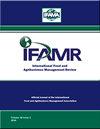欧洲各国在农村发展挑战方面是否存在差异?来自欧盟农村领导人的社会和经济背景
IF 1.5
4区 经济学
Q3 AGRICULTURAL ECONOMICS & POLICY
International Food and Agribusiness Management Review
Pub Date : 2022-07-12
DOI:10.22434/ifamr2021.0147
引用次数: 2
摘要
农村发展已成为欧洲面临的一项重大政策挑战。更多的就业机会越来越多地集中在城市地区,使农村地区的人口规模和经济增长不断下降。在这方面,对农村社区产生积极影响的农村创业活动被纳入欧洲一级更广泛的社会或结构政策。这篇文章的目的是调查五个欧洲农村地区的社会和经济挑战及其创新解决方案:克罗地亚(斯洛文尼亚),德国(本文章由计算机程序翻译,如有差异,请以英文原文为准。
Are there any differences in rural development challenges within European countries? Social and economic contexts from EU rural leaders
Rural development has become a significant policy challenge in Europe. More employment opportunities have increasingly been concentrated in urban areas, leaving rural regions with ever-continuing down-fall in terms of population size and economic growth. In this context, rural entrepreneurship activity that positively influences rural communities is embedded in broader social or structural policies at the European level. The aim of the article is to investigate societal and economic challenges and their innovative solutions in five European rural regions: Croatia (Slovania), Germany (Münsterland, Saxony-Anhalt), Poland (Małopolska), and Portugal (Alto Minho). This study follows a multi-case method which investigates the diversity of challenges and solutions in selected European rural areas. The comparative analysis reveals that most essential activities aimed at alleviating the development problems of rural areas include education of local communities, improvement of economic and digital infrastructure, activities supporting production and promotion of local products, promotion of cooperation between local communities and producers, and stronger orientation of local policy towards financial support of production enterprises and farms. The conclusions resulting from the study lead to formulating recommendations concerning rural policies in the context of developing entrepreneurship strategies in rural areas.
求助全文
通过发布文献求助,成功后即可免费获取论文全文。
去求助
来源期刊

International Food and Agribusiness Management Review
AGRICULTURAL ECONOMICS & POLICY-
CiteScore
2.90
自引率
0.00%
发文量
0
审稿时长
>12 weeks
期刊介绍:
The IFAMR is an internationally recognized catalyst for discussion and inquiry on issues related to the global food and agribusiness system. The journal provides an intellectual meeting place for industry executives, managers, scholars and practitioners interested in the effective management of agribusiness firms and organizations.
IFAMR publishes high quality, peer reviewed, scholarly articles on topics related to the practice of management in the food and agribusiness industry. The Journal provides managers, researchers and teachers a forum where they can publish and acquire research results, new ideas, applications of new knowledge, and discussions of issues important to the worldwide food and agribusiness system. The Review is published electronically on this website.
The core values of the Review are as follows: excellent academic contributions; fast, thorough, and detailed peer reviews; building human capital through the development of good writing skills in scholars and students; broad international representation among authors, editors, and reviewers; a showcase for IFAMA’s unique industry-scholar relationship, and a facilitator of international debate, networking, and research in agribusiness.
The Review welcomes scholarly articles on business, public policy, law and education pertaining to the global food system. Articles may be applied or theoretical, but must relevant to managers or management scholars studies, industry interviews, and book reviews are also welcome.
 求助内容:
求助内容: 应助结果提醒方式:
应助结果提醒方式:


